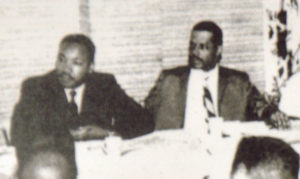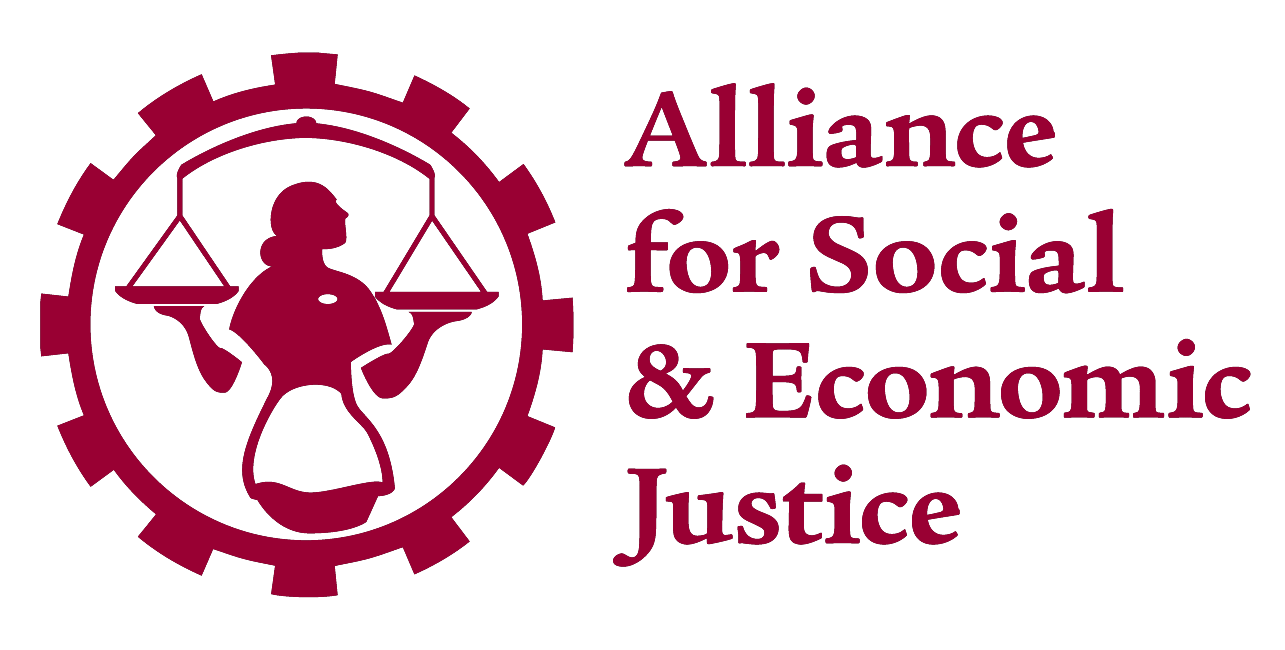
Jack O’Dell worked with Dr. Martin Luther King and the Southern Christian Leadership Conference as Director of Voter Registration in seven Southern states from 1961 to 1963. He was an Associate Editor of Freedomways magazine, the leading quarterly journal of the Civil Rights Movement in the 1960s and ‘70s. He was an Associate Professor of Economic History at Antioch College’s graduate school of education in Washington, D.C., from 1970 to 1973. He directed the International Affairs Department of the National Rainbow Coalition from 1985 through 1993.
Jack O’Dell wrote the Democracy Charter to put it out in the public domain to incorporate into a national conversation to develop an affirmation of democracy. He is not claiming ownership of it and considers it only a draft to undergo further revisions by people. He expects people to expand and change sections through discussion first in small groups, then regional discussions, in constantly evolving incarnations towards building a national Democracy Charter movement. The purpose of the Democracy Charter is to advance a concrete program for the full realization of democracy, and encourage new paradigms for unity of all democratic forces.
The Democracy Charter is rooted in the historic experience of movements that have sought to build broad participation in the struggles to advance democracy. The sections are programmatic areas that can be developed on their own while the Charter in its totality links all of the issues together. It is written in clear, direct language for people to comprehend and take action. The Democracy Charter was drafted for building a national conversation aimed at establishing a force that unifies movements and contributes to the building of a progressive majority in this country.
The Democracy Charter is rooted in three significant events in 1955. The Bandung conference held in Indonesia gave birth to the Non-Aligned Movement and established the prospect that the struggle to abolish colonialism would be victorious. The Congress of the People in South Africa adopted the Freedom Charter to guide the movement to abolish apartheid. The Montgomery bus boycott in Alabama inspired the freedom movement across the United States to abolish institutional racism. Each of these events has informed our activism in the movement today.
There are earlier examples of chartist movements, such as the 19th century British Chartist movement for democratic reforms. The name of the movement came from a document called the People’s Charter, which listed several democratic demands that galvanized the working class. The Chartists organized many protests, and collected millions of signatures on the People’s Charter. This movement was central to the development of the British trade unions, as well as to the later movement in opposition to British intervention on behalf of the Southern slave owners during the U.S. Civil War. Abolitionist Frederick Douglass came from the United States to mobilize anti-slavery solidarity in Europe and met with the Chartists.
The Democracy Charter lifts the things that are at the core of democracy to a deeper level of human rights. The Charter seeks to build an activist base to recast the definition of democracy. It provides the scaffolding to build a consciousness of democracy. We have seen a hollowing out of the framework of democratic rights in this country. We either take democracy to another level or we go backwards. Our society suffers from deep distortions of democracy exemplified by an oppressive prison system and use of torture. If we don’t move forward to advance democracy to a higher level, we will experience intensified oppression and social chaos.
Bill Fletcher, Executive Editor of BlackCommentator.com and co-founder of the Center for Labor Renewal and the Black Radical Congress, said the Democracy Charter is a polemic against post-modernism, the notion that there is no overarching way of linking struggles. The Democracy Charter is the politics of understanding the moment and then responding with the building of broad alliances for change. We cannot defeat capitalism in small sectoral groups, but we have to have allies and the ability to win, Fletcher said. To do so, we must integrate the Democracy Charter in discussions with our constituencies, and develop working people’s assemblies and working people’s agendas, Fletcher said.
Steve Williams, National Secretary of LeftRoots and former executive co-director of People Organized to Win Employment Rights (POWER), said that the Democracy Charter provides an alternative showing how communities can be reconstructed and nations can relate differently. The Democracy Charter can build a core of people active in working class communities, in communities of color, and gay and lesbian communities who will build a progressive majority, according to Williams.
Jackie Cabasso, executive director of the nuclear disarmament group Western States Legal Foundation and member of the steering committee of United for Peace and Justice, said that the Democracy Charter contributes a causal analysis of how society works to analyze the levers of change, and a comprehensive vision that allows people to see the interconnectedness of issues in a way that undermines neo-liberalism, individualism and privatization.
The Democracy Charter identifies this current period as the Second Reconstruction. According to James Campbell, a close friend of O’Dell, if this can become a national concept, it will reverse the abandonment that African Americans felt from the betrayal of the first Reconstruction, to unity across racial lines in a national project.
Description of Organizational and Educational Work with the Democracy Charter
Small Group Discussions
People who are in the same area of mass work would meet and engage in a discussion of that section of the Democracy Charter that is relevant to their work, and its interconnections to other sections. They would meet two or three times to relate the Democracy Charter to things that they are doing. Then each person would conduct a small group discussion on the Democracy Charter. This multiplier effect will build a Democracy Charter movement. Organizations can adopt a method of studying the Democracy Charter, and its applicability to everyday struggles from their own experience.
Cadre-building Strategy
The initial phase is to develop a cadre that understands the present system is broken. The discussion helps them to grasp tactics in working for a transformation of society. The discussion opens up a structure, process, and relationship for people to learn to connect what are the greatest negative impacts that caused things to be broken, and how things can only be fixed by having a stronger, more advanced democracy. The Democracy Charter anchors these small groups so that they see how issues are linked across the board and how to break through the cul-de-sacs of their single issues to find each other. The language and practice that are used every day to advance separate issues are linked into an inseparable whole that requires joint action in order to progress.
Regional Meetings and Conferences
The small group discussions would constitute a framework to organize regional conferences. A larger regional discussion would create an agenda and curriculum to discuss and inform a historical analysis and assessment of conditions today, and define actions that can be taken, using the Democracy Charter as a central organizing document. The conferences would lead to further organizing a Democracy Charter movement.
This will create the formation of a national movement that will develop people’s class consciousness, so that they know which side of the fence they are on, and their class analysis, so that they who is there with them.
